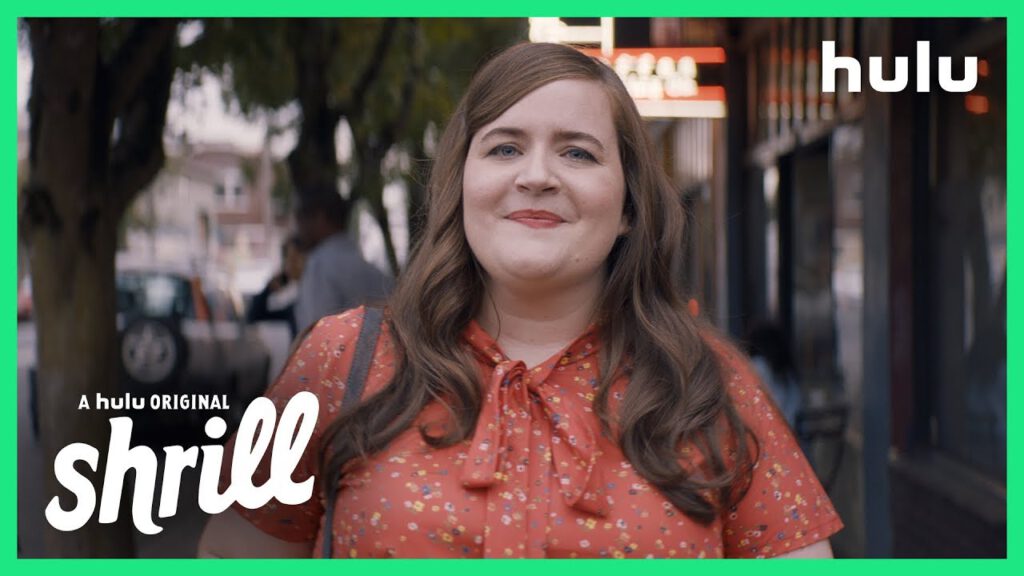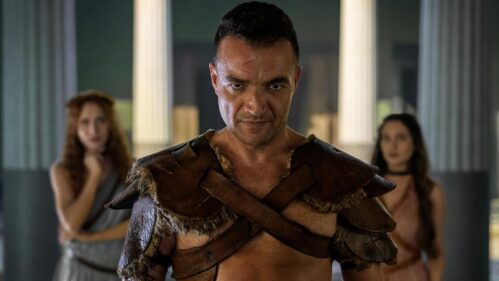There’s a moment near the end of “Annie,” the first episode of “Shrill,” in which our heroine is subjected to yet another microaggression, the latest in what seems like an unending string. The first—the first we see, anyway—comes from the same woman, Tanya, a trainer who tells Annie, unprompted, about the skinny person inside her just dying to get out. But by episode’s end, Annie’s done some soul-searching. She is, as she winningly tells her roommate, quite possibly feeling herself. She puts on a new dress that’s insanely flattering, ditches a guy who treats her badly, stands up to her boss, and seems to have reached a new phase in her life. She’s happy! She’s confident! She’s being kinder to herself! And then Toned Tanya strikes again. As Annie walks away, she’s still got that feeling-herself smile on her face, but it’s different. It’s not forced or fake, but there’s an effort required to keep it there. She’s still feeling herself, but it’s a feeling that requires sheer force of will to maintain. Annie’s life is about a hell of a lot more than her body. The world often has other ideas.
The same can be said of “Shrill,” Hulu’s new series loosely based on Lindy West’s Shrill: Notes from a Loud Woman. It’s about Annie’s life, what she wants and who she loves and how she feels about herself. It’s also about her body—her fat body—and how the vessel that carries her around the world affects the way she’s treated by the people she encounters. It’s possible that, like me, you’ll leave “Shrill” wishing more time had been spent on stories in which Annie’s body doesn’t take center stage. It can be frustrating, but it’s perhaps unavoidable. Most of the world can’t wait to make it all—health, love, writing, sex, buying coffee, being late, walking down the street and minding her own business—about her body. That’s part of her life, too. How could “Shrill” not do the same?
Luckily, “Shrill”—created by West, Bryant, and showrunner Ali Rushfield—has a not particularly secret weapon. It knows that its protagonist contains delightful multitudes, and that the actress playing her does, too.

Annie (“Saturday Night Live'”s Aidy Bryant, incalculably valuable) has a lot on her plate. There’s her job, working as an assistant calendar editor at “The Thorn,” a Portland-based publication that’s a bit like your local alt-weekly, “The Daily Beast,” and “Time Out” had a baby. There’s her love interest (Luka Jones), for lack of a better term, who won’t buy a second pillow for his bed (“I’m your pillow”) and makes her leaves through the back door. She’s got a roommate and best friend (Lolly Adefope) who’s supportive, and who (most fortunately) unblushingly says the hard things. There’s her boss (John Cameron Mitchell), a renowned journalist and something of a queer icon whose recognition of Annie’s talents doesn’t prevent him from treating her like garbage. There are her parents (Julia Sweeney and Daniel Stern), two kind people who love her but who have very different methods of showing that love, one more pleasing than the other.
Most importantly, there’s Annie’s own mind. It works feverishly. Mostly, it’s on her side, but the world puts a lot of really bad data out there for her analysis. In Bryant’s hands, that mind is on quiet but unceasing display. The impression created is one of a person accustomed to not pressing her pain, anger, and joy on anyone else; it’s always tucked away. Yet Bryant lets the audience in on those moments. Of “Shrill’s” many successes—and there are many—it’s this that’s the most striking. The series takes full advantage of Bryant’s comedy chops, and Annie’s jokes always emerge directly from whatever big emotions or ideas she’s processing at the moment; it allows her plenty of dramatic work too, but even the weightiest scenes don’t abandon Annie’s wry, casual sense of humor. She’s a fascinating character, played by a fascinating performer, and Bryant makes “Shrill” worth watching all by herself.

But she’s far from the only reason to give this series your time. The cast is uniformly excellent—Mitchell and Adefope are standouts, but Jones does yeoman’s work in making a pretty terrible guy almost likeable—and the world in which the characters move is every bit as engaging. “Pool,” the series’ fourth episode, is particularly striking in this regard. Credited to writer Samantha Irby and directed by Shaka King, it sees Annie the much more comfortable and confident Fran visit a “Fat Babe Pool Party,” an idyllic scene populated by fat women in gorgeous bikinis, flowing sheer caftans and some seriously fabulous sunglasses and headwraps, drinking frozen margaritas and dancing without anything resembling self-consciousness. King captures the event in beautiful candy colors, lending the episode—or that piece of it—a feeling of tranquility and Oz-like wonder echoed in the face of a woman who floats blissfully past the camera on a bright pink inner tube without an obvious care in the world.
Of course, cares intrude, as they always do. “Shrill” admirably bypasses a lot of what you might call “Talking About Bodies 101”—there’s no discussion of whether or not it’s acceptable to use the word fat, no teary monologue about when food became a crutch, none of that. Annie’s own hangups get explored, but so do the wrongheaded notions of others. That tension reaches its height in the relationship between Gabe, Mitchell’s character, and Annie. Gabe, a gay man, knows what it’s like to be treated as an other, judged, dismissed, and often hated for who you are. Yet it doesn’t stop him from saying things like “healthy bodies, healthy minds” to his employee when she arrives late for a “forced fun” biking event, implying that her tardiness is linked to her fatness, and that her fatness is an indication of inherent inferiority of mind and person.
And then “Shrill,” ever smart, always pushing past the first question to the next, allows him to be both wrong and right about the way Annie conducts herself at work. It’s more interesting, and more like life, to allow people to be awful and right, wonderful and wrong, abusive and tender, loving and selfish. To see “Shrill” as a body positivity show and nothing more is like seeing Annie as nothing but a fat body with a fat woman’s struggles. To write damaging people as mustache-twisting villains who are always wrong, or protagonists as valiant heroes whose goodness never falters, is to ignore the lovely or insidious ways such people can affect others. It’s easy to brush past that stuff, but it’s a hell of a lot less interesting. A smile can be even more compelling when you know the work required to keep it alive.












